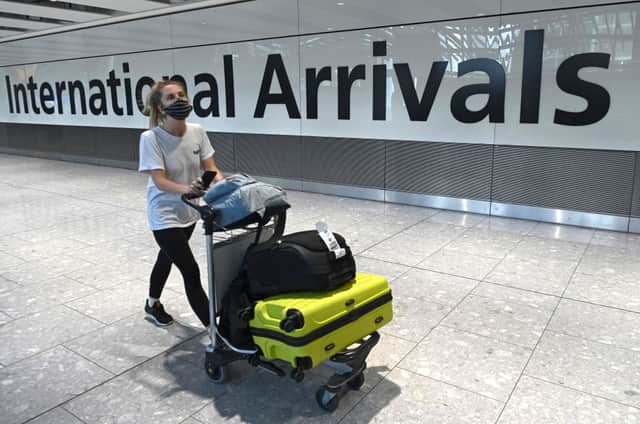These are the new Omicron travel rules that have come into effect


Travellers will have to take a pre-departure test before arriving in England from today (7 December) as part of new rules designed to slow the spread of the Omicron variant.
Health Secretary Sajid Javid has warned that the new Covid variant was now spreading within communities and not just linked to international travel.
Advertisement
Hide AdAdvertisement
Hide AdScientists have also warned that Omicron will be the dominant variant in the UK within weeks and that the number of cases is doubling every three days.
In a bid to slow the spread of the coronavirus strain, the Government has introduced these new travel rules.
Pre-departure tests before arriving in England
All travellers will now be required to take a Covid pre-departure test before arriving in England.
Anyone travelling from countries not on the red list will have to take the test a maximum of 48 hours before leaving, regardless of their vaccination status.
If they test positive, they will not be allowed to travel.
Advertisement
Hide AdAdvertisement
Hide AdScotland and Wales have said they will implement similar measures.
The measure comes amid warnings that the time between infection and infectiousness could be shorter with the new strain.
People arriving from countries on the red list of travel restrictions will need to quarantine in hotels for 10 days and take two Covid tests.
Nigeria was added to the list from 4am yesterday (6 December) along with Angola, Botswana, Eswatini, Lesotho, Malawi, Mozambique, Namibia, South Africa, Zambia and Zimbabwe.
What Sajid Javid said about the new measures
Advertisement
Hide AdAdvertisement
Hide AdMr Javid said the measures have been introduced to slow the spread of Omicron and that the Government could not “say for certain” whether the new variant would escape Covid vaccines or how severe a disease it will cause.
He said: “We are learning more about this new variant all the time.
“Recent analysis from the UK Health Security Agency suggests that the window between infection and infectiousness may be shorter for the Omicron variant than for the Delta variant, but we don’t yet have a complete picture of whether Omicron causes more severe disease or indeed how it interacts with the vaccines.
“We can’t say for certain at this point whether Omicron has the potential to knock us off our road to recovery.”
Advertisement
Hide AdAdvertisement
Hide AdHe added: “We are leaving nothing to chance. Our strategy is to buy ourselves time and to strengthen our defences while our world-leading scientists assess this new variant and what it means for our fight against Covid-19.”
But he said of the cases identified so far, none had resulted in hospital admission.
Mr Javid added that the measures were temporary, and acknowledged they would cause disruption.
He said: “We’re taking this early action now so we don’t have to take tougher action later on, and so that we can take every opportunity to prevent more cases from arriving in our country.”
How many Omicron cases are in the UK?
Advertisement
Hide AdAdvertisement
Hide AdMr Javid told the Commons yesterday that there were “261 confirmed cases in England, 71 in Scotland and four in Wales, bringing the total number of confirmed cases across the UK to 336.”
The Government said, as of 9am on Monday, there had been a further 51,459 lab-confirmed Covid-19 cases in the UK.
It also said that a further 41 people had died within 28 days of testing positive for Covid-19.
Separate figures published by the Office for National Statistics show there have now been 170,000 deaths registered in the UK where Covid-19 was mentioned on the death certificate.
A version of this article originally appeared on NationalWorld.com